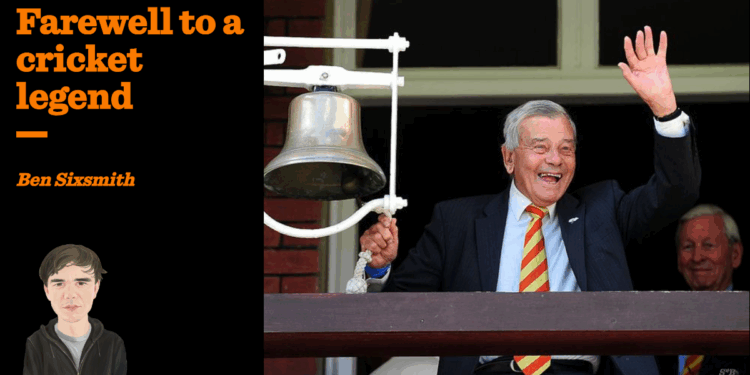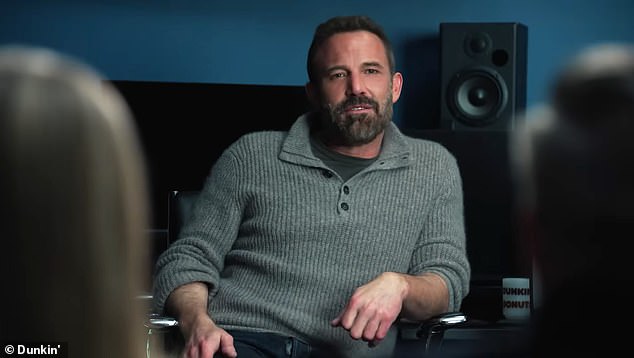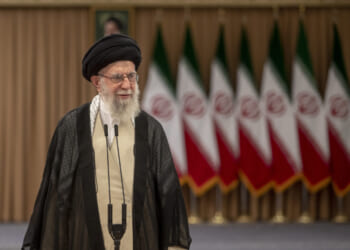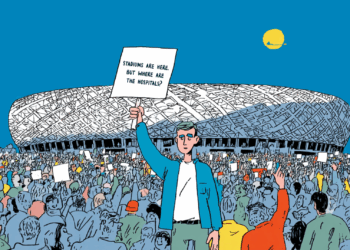RIP, Harold “Dickie” Bird — cricket player, umpire and raconteur.
I’m not always sure how sad it is when someone dies in their nineties. They have had a good innings (no pun intended). Perhaps with their health declining and their opportunities, they don’t really want to hang around.
But perhaps they do. In an interview to mark the death of his very, very longtime friend Michael Parkinson, who had died 88, Bird broke down as he remembered their last conversation. They might have been talking for more than seven decades but Bird was clearly heartbroken that they would not speak again. There was always more to say.
That was the sort of man he was — or, at least, that was the sort of man he seemed to be. He radiated enthusiasm — enthusiasm for cricket and enthusiasm for life. Through him, his admirers developed it as well.
When I was a boy, I loved his lightness of spirit and his sense of humour — treasuring his memoirs and a tape of his stories. I named him as my hero in a class at school when I was about ten, which must have thoroughly baffled my classmates. (“Nerd” didn’t quite cover it.)
Harold “Dickie” Bird was born in Barnsley at a time when your options were, by and large, to work in a coal mine or — if you were lucky — to work in the offices of a coal mine. It was not for him. He was a cricket fan, and found himself playing in the same team as a young Parkinson, who would go on to become Britain’s most famous interviewer, and Geoffrey Boycott, who would go on to become Britain’s most irascible batsman and funniest commentator.
Bird played for Yorkshire and Leicestershire, but he was an unmemorable player, scoring only two hundreds in 93 games as a batsman. When he became an umpire, though, he was more than memorable — he was downright iconic.
“There is for all his Yorkshire common sense a surreal streak in Dickie which makes him irreplaceable,” wrote Parkinson in the foreword to his friend’s memories, “Only Shakespeare could have invented a character so full of life’s rich juices.” He was certainly a surreal character — always joking, on and off the pitch, with matches never far from devolving into a silly little dance. There was something irresistibly evocative about him, such as when he sat down on the pitch, annoyed but stoical, when a match was interrupted by a bomb scare. You could have painted the scene.
Yet he also had that common sense — as well as the fairness and courage that made him respected as well as loved. Eccentricity can be endearing when it is unaccompanied by talents — but the combination is something very special.
Towards the end of his career as an umpire, Bird faced accusations of hogging the limelight. Perhaps he did a bit — or perhaps there was some extent to which the camera was following him because it expected good TV. But I don’t think anyone would claim that Bird’s passion and joie de vivre were inorganic. An artificial person seeking fame for its own sake simply would not have become an umpire.
There’s a certain sadness in remembering a time when cricket was a bit less professionalised — a bit less corporate — with more space for eccentricity to bubble. There’s a certain poignancy in remembering a time when British culture was not so tightly wound that eccentricity did not so often feel contrived — a tool of glib PR campaigns for “social cohesion”.
Or perhaps I’m just getting old. Either way, I shouldn’t let a tribute to such an enthusiastic man lapse into miserabilism. Bird, who was childless and unmarried, built his life around cricket and the people who played it. He loved the sport and he loved the players — totally and uncynically. Embodying this passion so charismatically meant that he could pass it on.
We could all do with a bit more genuine enthusiasm in our lives — even us opinion columnists, for whom the morbid and the corrupt are our food and drink.
RIP, Dickie. Let’s have one more standing ovation for a great career.












